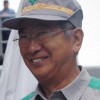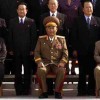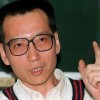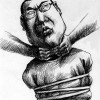Latest posts by Andy Yee from October, 2010
Shintaro Ishihara’s views on China, Japan
Shintaro Ishihara is a politician, author and governor of the Tokyo Metropolitan Government since 1999. He is well known for his critical stance on Japan’s dependence under the US-Japan security alliance. In 1989, he co-authored the book The Japan That Can Say No with then-Sony chairman Akio Morita. He is...
China: Declaration on Liu Xiaobo's award of Nobel Peace Prize
Bullogger contains a declaration on Liu Xiaobo's award of Nobel Peace Prize, signed by hundreds of intellectuals, writers, journalists, lawyers and other citizens, including Xu Youyu and Cui Weiping. It is available in Chinese, English, French and Japanese.
Should China continue to support North Korea's Kim dynasty?
North Korea’s next leader Kim Jong-un, the youngest son of ailing Kim Jong-il, made a high-profile public appearance at a gala anniversary celebration in Pyongyang on Saturday. North Korea’s top ally, China, is sending a heavyweight delegation that will stay in North Korea from Saturday to Monday. According to state...
China's ‘Directed Public’ receives Nobel Peace Prize
Timothy Cheek from the University of British Columbia has a video commentary on the Nobel Peace Prize and an article on China's directed public sphere at Asia Pacific Memo.
China: Liu Xiaobo the intellectual
On 8 October 2010, Liu Xiaobo was awarded the Nobel Peace Prize. He is a renowned literary critic, political essayist and activist based in Beijing. Trained in literature and philosophy in the 1980s, he was then described as a ‘dark horse’ in China’s literary circle for his pointed critiques and...
China: Chang Ping on the state of media
China Media Project posted a partial translation of Taiwan's Want Daily interview with Chang Ping, veteran journalist and CMP fellow, about the current state of media in China. Our site also carries a translation of other parts of the same interview which focuses on Chang Ping's personal feelings of working...
China: How a media professional upholds his liberal values
In China’s illiberal media environment, Zhang Ping (pen name Chang Ping) is a rare liberal breed. To maintain an independent voice in China’s heavily censored media is a fundamental dilemma, and, as the experience of Chang Ping shows, it often takes a sense of martyrdom to do so.




